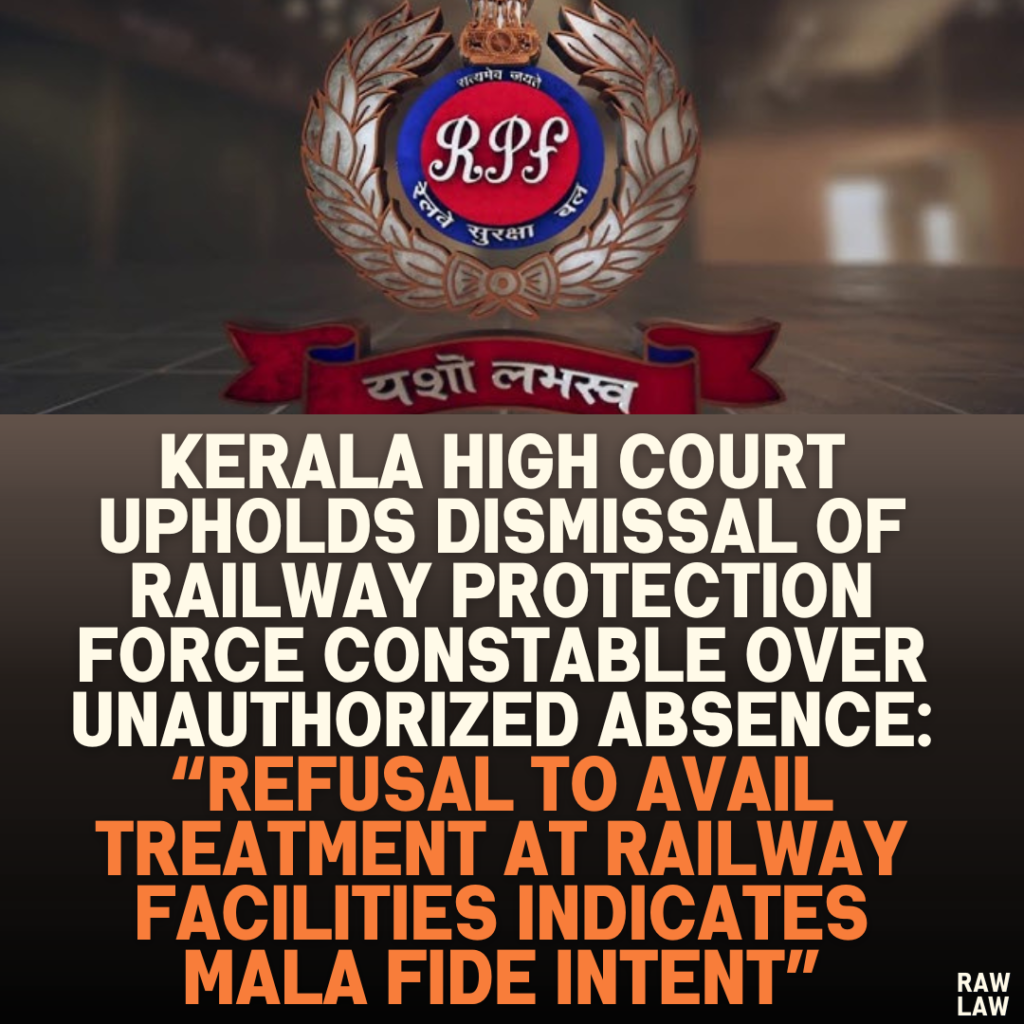Court’s Decision
The Kerala High Court dismissed the writ petition filed by the petitioner, a Railway Protection Force (RPF) constable, challenging the disciplinary proceedings initiated against her. The petitioner was initially removed from service due to alleged unauthorized absence, which was later modified by the appellate authority to compulsory retirement. The court ruled that the disciplinary actions were justifiable under the law and upheld the findings of misconduct against the petitioner.
Facts
- The petitioner, an RPF constable, suffered a knee ailment and underwent treatment at a government hospital (Medical College Hospital, Thiruvananthapuram), rather than the Railway’s authorized medical facilities.
- Despite multiple instructions to appear for treatment at the Railway Hospital, Madurai, she failed to comply, citing personal reasons and family responsibilities.
- The petitioner alleged misconduct by doctors at the Railway Hospital, Thiruvananthapuram, and preferred treatment elsewhere, which she communicated to the authorities.
- Her name was removed from the sick list by Railway authorities, and she was directed to rejoin duty. However, she continued her absence without official approval, claiming she could not get certified fit for duty by the Railway Medical Board.
- Disciplinary proceedings were initiated against her, and she was removed from service. Upon appeal, the penalty was reduced to compulsory retirement.
Issues
- Did the petitioner’s unauthorized absence and refusal to use Railway medical facilities constitute misconduct under the rules?
- Was the disciplinary action taken by the Railway authorities proportionate to the alleged misconduct?
- Did the petitioner’s actions amount to deliberate non-compliance with Railway regulations?
Petitioner’s Arguments
- Medical Treatment: The petitioner contended that her absence was due to her medical condition and that she had valid reasons for seeking treatment at a government hospital instead of a Railway facility.
- Family Responsibility: She argued that her inability to stay at the Railway Hospital, Madurai, was due to family obligations, particularly the care of her young children.
- Rule Interpretation: The petitioner claimed that Rule 603 of the Indian Railway Establishment Code permitted treatment at non-Railway facilities under specific circumstances, which applied to her case.
- Disciplinary Actions: She argued that the penalty imposed was excessive and disproportionate, as her absence did not amount to willful misconduct.
Respondent’s Arguments
- Non-Compliance: The Railway authorities emphasized that the petitioner failed to comply with Rule 603, which mandated treatment at Railway hospitals unless unavailable.
- Unauthorized Absence: The petitioner was repeatedly instructed to appear for treatment at Railway facilities and rejoin duty, but she did not comply.
- Mala Fide Intent: The respondents highlighted evidence of the petitioner’s foreign travel during the absence period, further establishing misconduct and non-compliance.
- Disobedience: Her refusal to undergo treatment at Railway hospitals and her failure to report for duty were clear violations of Railway Protection Force (RPF) Rules 146 and 272.
Analysis of the Law
- Rule 603 of Indian Railway Establishment Code: This rule entitles employees to free medical treatment at Railway hospitals, but allows treatment at government facilities only if Railway facilities are unavailable. In this case, Railway facilities were available, and the petitioner’s refusal to use them violated the rule.
- RPF Rules: Rule 146.2 considers unauthorized absence as neglect of duty, while Rule 146.3 deems refusal to follow medical instructions as disobedience. The petitioner’s actions breached both these provisions.
- Unauthorized Absence as Misconduct: The court clarified that unauthorized absence constitutes misconduct when it is willful and deliberate, as established in this case.
Precedent Analysis
- Krushnakant B. Parmar v. Union of India (2012) 3 SCC 178: The court distinguished this case, noting that in Parmar, there was no evidence of willful misconduct, whereas in the present case, the petitioner’s actions clearly demonstrated intentional non-compliance.
- Union of India v. P. Gunasekaran (2015) 2 SCC 610: The court reiterated that judicial review in disciplinary matters is limited and does not extend to re-evaluating evidence or proportionality of punishment unless it shocks the conscience.
Court’s Reasoning
- The court observed that the petitioner’s refusal to seek treatment at Railway hospitals, as mandated, was a deliberate act.
- Evidence of the petitioner’s foreign travel during her unauthorized absence further indicated mala fide intent.
- The petitioner’s non-compliance with directives to report to duty or appear at Railway facilities constituted neglect of duty and disobedience under RPF Rules.
- The court affirmed that the disciplinary proceedings were conducted fairly and upheld the conclusions drawn by the inquiry authority.
Conclusion
The court upheld the findings of misconduct and dismissed the writ petition, ruling that the penalty of compulsory retirement was proportionate to the severity of the petitioner’s actions. The court emphasized that strict adherence to service rules is crucial for the proper functioning of institutions.
Implications
- This judgment reinforces the principle that employees must adhere to institutional protocols, particularly in government service.
- It underscores the significance of using authorized facilities and complying with official directives, failing which disciplinary actions will stand validated.
- The decision sets a precedent for service jurisprudence by affirming that willful misconduct and disobedience will be met with strict penalties.




Pingback: Delhi High Court Affirms Maintainability of Subsequent Purchasers' Appeals Under SARFAESI Act, Sets Aside DRAT Order and Remands Case for Reconsideration on Merits with Pre-Deposit Directive - Raw Law
Pingback: Delhi High Court Allows Substitution of Debt Assignee Despite Procedural Defects: "Courts Are Meant to Do Justice, Not Decide Applications Based on Technicalities" - Raw Law